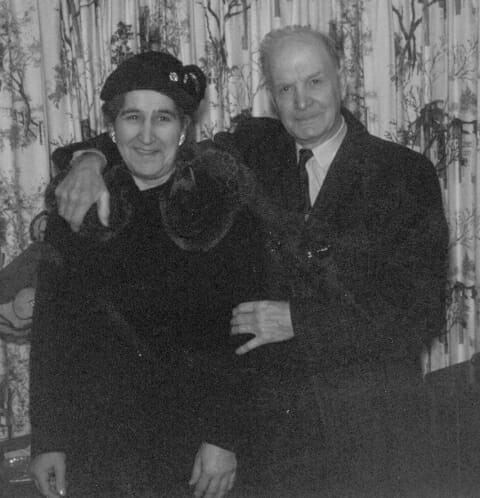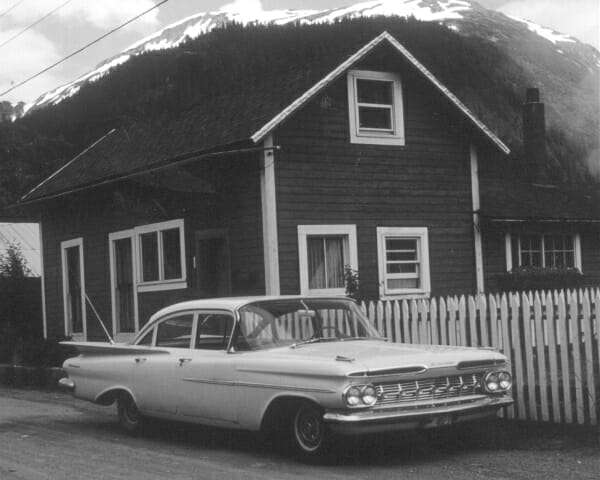Gastineau Channel Memories
Clauson, Oscar & Katherine (Dewitt)
Beda Clauson Stewart
Oscar Harvey Clauson, born in 1888, in Granna, Sweden, came to the United States in 1905, at age 17 with an eighth grade education. After working on farms in Minnesota and ranches in Montana, he worked for the Great Northern Railway and then in 1917, joined the Army during the First World War. After receiving the Distinguished Service Cross for service in France, he was discharged at the end of the war in 1919, and became a U.S. citizen. He then worked in Seattle for several years during which time he owned and operated a service station. In 1924, with a dream of striking it rich in the gold fields, he moved first to Fairbanks to work in the placer mines and then in about 1930, to Juneau to work in the Alaska-Juneau Gold Mine. It was there that he met Katherine Theresa Dewitt.
Katherine, the youngest of ten children, was born in 1903, in Canton, Missouri. She attended school in Canton until the eighth grade and at age18, moved to Quincy, Illinois, where she worked in a shoe factory and saved money to buy a Model T Ford. In 1929, she and her sister Celeste and Celeste?s husband Russell McGee drove the Model T from Missouri to Seattle. They boarded a ship and arrived in Juneau the fall of 1929.
Katherine and Oscar met in Juneau and were married there in 1933. They had two children, Harvey Franklin (named after Franklin D. Roosevelt) born in 1934, and Beda Christine born in 1935. The family lived in a small one bedroom house on pilings located half a block from the boat harbor on south 12th Street. Oscar continued to work at the AJ mine until early in the Second World War. When the Japanese attacked Dutch Harbor, Oscar took his family to Missouri where they remained for eight months while Oscar returned to Alaska to work in the Aleutian Islands for the U.S. Army Corps of Engineers as a heavy equipment operator. The family returned to Juneau in the fall of 1942.
Beda remembers that during the war there were air raid drills in which all the students went to mine tunnels and other bomb shelters. During this time, recreation for the family included picking blueberries and hiking to Thane to visit friends and rides to the Mendenhall Glacier in the rumble seat of the Albert Tucker family?s car. Oscar was still working in the Aleutians and came home periodically and the family continued to live in the house on 12th Street. Many evenings while Oscar was away, Katherine walked with Harvey and Beda to the Post Office in the Federal Building to see if there was mail from Oscar.
The family home on 12th Street was adjacent to the Smith Dairy and Harvey and Beda spent much time there and became friends with the Smiths and played at the dairy. They also constructed makeshift rafts, which they floated alongside the house when the tide came in. Later the boat harbor was dredged and the sludge was used to fill under and around the house. That ended the rafting. The fill also helped to eliminate the rat population as it became necessary for all the houses in the area to be connected to the city sewer rather than dumping directly onto the tide flats. At the same time, the dairy, which had also used the tide flats for waste disposal, was required to move out the road and a creamery building was constructed in its place.
When Oscar returned from his work in the Aleutians, he took a job as a grader operator working for the City of Juneau street department. Later he was a plumber and maintenance worker at the subport and after that a custodian in the Federal Building. He also volunteered time to a relief agency interviewing families in need.
After the war, when Beda was 12, Katherine went to work at the Alaska Laundry and later became a maid at the Gastineau Hotel on Franklin Street. Each evening after work she and her sister Celeste could be seen walking along Willoughby Avenue from the hotel to south 8th Street where the Clauson?s had moved in 1947. This home too, was on pilings, although the street in front was filled and Oscar worked to obtain more fill to create an area for a large garden alongside the house.
During the 40?s, Beda remembers fishing at the small boat harbor, riding horses and playing in the barn at the Smith?s Dairy, swimming at the airport and Dredge Lake and sharing many hours with classmates who have become long lasting friends. They spent a lot of time at the Teenage Club, operated by Zack Gordon, when it was converted from a USO Service Club after the war. In the winter, skiing was a major activity. Since the family had no car, Beda and her friends hiked across the Juneau-Douglas Bridge and then up the trail to the 2nd or 3rd cabin. There was a small rope tow at the second cabin where many skiers went each weekend.
Harvey graduated from Juneau High School in 1952, and Beda in 1953, and both went ?outside? to attend college. Harvey worked for the City of Juneau street department during the summers. After serving in the Army at Fort Richardson, Harvey went to work for Boeing where he remained until his retirement. Beda attended Oregon State College and later graduated from the University of Washington.
In 1962, when he was 72 years old, Oscar rebuilt the house on 12th Street into a four-bedroom house and moved into it when the property on 8th Street was taken for the Egan Expressway. In 1965, the property on 12th Street was sold to the Juneau School District for the construction of the new Juneau Elementary School and Oscar and Katherine moved to Seattle to be nearer to their children and grandchildren. Oscar died in 1974, in Seattle at age 86. Katherine then moved to Colville, Washington, where Beda and her husband Fred were then living. She died in Colville in 1991 at age 88.
 |
Oscar and Katherine Clauson, winter of 1963. |
 |
Clauson home on 8th Street, summer of 1960. |
